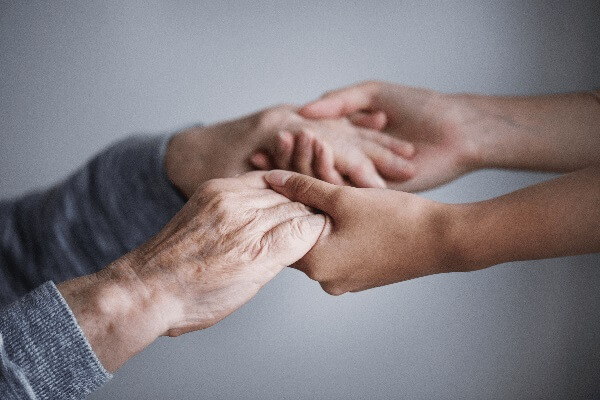An overview of how cancer can become a burden for an entire family and how a caregiver can help lighten the load. Cancer can be a long journey and being prepared for what to expect will help you and your loved ones.
The sadness and shock that takes over when a loved one becomes diagnosed with cancer is a pain and emotional many of us have unfortunately experienced. Statistically, The American Cancer Society states that the lifetime probability of being diagnosed with cancer is 39.7% for men and 37.6% for women. When someone close to you gets diagnosed with cancer, it is not easy, but being there for them is important in their cancer journey. When you are a caregiver of someone who has cancer, you become a part of their cancer care team and are involved in managing their care. This includes day to day tasks and emotional support. Being a caregiver can be frustrating and painful, but it can also be satisfying providing care for that person when they need it the most.
You may not know a lot about cancer, and that is okay, everyone is going through this journey together. Cancer can start in any place in the body, and there are many different types of cancer. In a technical definition, cancer is when the cells start to grow out of control. The cancer cells keep on growing and making new cells. They crowd out normal cells. This causes problems in the part of the body where the cancer started. Some cancers grow and spread fast, while others do not. This means that cancers respond to treatments in different ways. Some cancers are treated with surgery, while others are treated with chemotherapy. Some cancers develop tumors or lumps, such as breast cancer. There are cancers that don’t form any lumps or tumors at all, such as leukemia. Each cancer is different for each individual.
To better understand cancer, it is important to understand there are different stages that mean different things about the cancer. Doctors need to know if and how far the cancer has spread in order to properly treat it. This is defined by four cancer stages. Stages one and two mean that the cancer has not spread a lot. Stages three and four mean the cancer has spread, with four being the highest stage. After the doctor has diagnosed the stage, it is time to come up with a treatment plan. The most common treatments for cancer are surgery, chemotherapy, and radiation. Surgery can be used to directly take out the cancer, and surrounding body part areas. Chemo is the use or drugs to kill cancer cells or slow their growth. This treatment can be given with an IV or a pill. Radiation is also used to kill or slow the growth of cancer cells, that can be used in combination with surgery or chemo. There is also the option to enroll in a clinical trial. Clinical trials give patients access to new treatments that are not yet available to the general public. This means that the treatment may be more effective then what is currently out there on the market. Having a better understanding of cancer and treatments is going to be helpful in understanding what the cancer patient is going through.
Reliable caregiver support is crucial to the physical and emotional wellbeing of someone with cancer. Caregivers have many roles, and this can be overwhelming for you as well. Doing this may take away from your own “me time” so it is important to understand the responsibilities and what is feels like to be a caregiver. Caregivers serve as home health aides and companions. This includes duties such as helping feed, dress, and bathing the patient. Caregivers can also be in charge of arranging schedules, managing insurance, and providing transportation. Caregivers most importantly give love and support. Remember that you do not have control over some aspects of the cancer. It helps to accept this rather than fight it.
Being a caregiver is an immensely meaningful role that truly shows your love and respect for that person. It is a good feeling to be helpful and it feels good to be needed by a loved one. You might find that caregiving enriches your life. You might feel a profound sense of fulfilment, confidence, and accomplishment in caring for someone. You may also learn about inner strengths and abilities that you didn’t even know you had and find a greater sense of purpose for your own life. Being a caregiver can open opportunities to meet new people, make new friends, and build new relationships. This role allows you to meet people who are going through the same situation as you, this gives a sense of comfort.
Although being a caregiver has its potential to be a life enriching job, it can also be frustrating. You never plan for a major health problem like cancer to now be a part of your life, and none of this is easy, but you can do this. There is a lot to suddenly deal with when you become a caregiver of someone with cancer such as an uncertain future, financial worries, unwanted lifestyle changes, and many difficult decisions to make. Caring for sick loved ones or patients can cause depression and emotional distress. Fear, sadness, doubt, and anger can take a toll not only on you, but on the cancer patient as well. Feeling sadness and grief is normal and it can be difficult to manage all these emotions. This can develop into physical symptoms such as extreme tiredness and trouble sleeping; therefore, you need to take care of yourself as well, it is just as important.
Take a deep breath, and don’t be afraid to ask for help. Join support groups, build friendships and relationships; you are not alone in this either. Being the caregiver of a cancer patient is scary but being positive is the best medicine you can give and take. Every day is an opportunity to love a little more.

